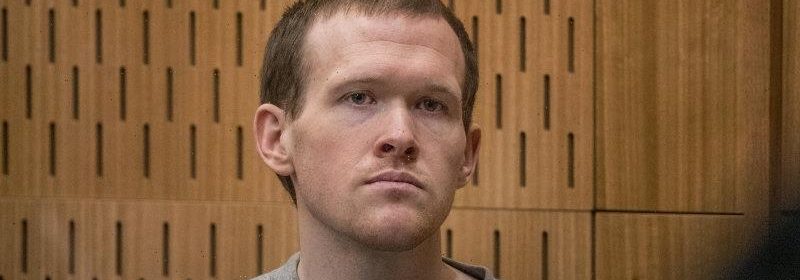Victims’ family anger over Christchurch shooting killer’s plan to appeal

Wellington: The gunman who killed 51 people at two Christchurch mosques says his guilty pleas were obtained under duress due to mistreatment in custody, according to a memorandum from his lawyer.
Human rights law specialist Tony Ellis said he expected the gunman, Brenton Tarrant, to file an appeal against his convictions relating to New Zealand’s worst mass shooting.
The proposed appeal has been labelled by survivors as “grandstanding” and an attempt by the terrorist to retraumatise the Muslim community.
Australian Brenton Tarrant was sentenced to life imprisonment without parole for the Christchurch mosque attacks in August last year. Credit:AP
Tarrant pleaded guilty in March 2020 to 51 charges of murder, 40 charges of attempted murder and one of engaging in a terrorist act resulting from the March 15, 2019, attacks on Al Noor and Linwood mosques in Christchurch.
He was sentenced to life in jail, without the possibility of parole, and is being held in a unit for prisoners of exceptional risk at Auckland Prison.
The offender told Ellis that his guilty pleas were obtained under duress, or in breach of the right not to be subjected to torture or cruel treatment. He had given Ellis about 15 pages of detailed description of the mistreatment.
“By this, he means he was subject to inhuman or degrading treatment whilst on remand, which prevented a fair trial,” Ellis wrote last week in a memorandum to the Chief Coroner, Judge Deborah Marshall.
Ellis wrote that he was “conscious of the major distress such an exercise of his right to appeal” could have on the victims’ families and society in general.
However, every accused or convicted person was entitled to exercise his right of access to the court, Ellis said in the memo to the coroner. Under the New Zealand Bill of Rights, everyone was entitled to be treated fairly and with dignity and respect, including the gunman, he said.
Speaking on behalf of the March 15 Whānau Trust, Abdullah Naeem said the terrorist was “playing games”.
Prime Minister Jacinda Ardern at the second anniversary memorial service. Survivors of the Chrstchurch shootings say an appeal will only retraumatise grieving families. Credit:Department of Internal Affairs
Naeem, whose brother and father were killed in the attack, hoped the law would stop the appeal going ahead, so families would not have to go through more trauma.
“Life imprisonment is a light punishment for what he did. Any good law will deny his plea and I hope that happens.”
Imam Gamal Fouda said the terrorist “wishes to become famous and grandstanding”, and he believed the courts should “continue to disregard his name”.
“This situation is causing further trauma to the whānau and the terrorist should not be given the opportunity to retraumatise all of us as New Zealanders.”
In a written response to Ellis’ memorandum, Judge Marshall said that the convicted terrorist would have an opportunity to be heard next month during a hearing about the scope of the coronial inquiry into the shootings, “just like all interested parties”.
Victims of the Christchurch mosque shootings arrive at the Justice Precinct for the accused terrorist’s High Court hearing in 2020. Pictured: Linwood mosque hero Abdul Aziz hugs a friend outside court.Credit:Joe Johnson/Stuff
As well as raising the possibility of an appeal, Ellis objected to the process of the coroner’s inquiry into the mosque deaths, with the possibility that court action may delay the inquests.
Ellis said he had learned that the coroner sent four letters to the offender in jail but these were not delivered. The coroner’s process treats the offender as an “interested party”.
The letters said that coroner Brigitte Windley would be looking at the causes and circumstances of the deaths in the mosque attacks.
The chief coroner wrote in a response to Ellis that she had been writing to the offender directly as she was not aware that he had legal representation.
Prison authorities have also stopped the offender from receiving copies of the Royal Commission of Inquiry report into the terrorist attack on the mosques – one copy sent by the Department of Internal Affairs and the other by Ellis – according to the lawyer.
Without access to the inquiry report, the convicted terrorist was unable to properly instruct his lawyer and the coroner’s inquiry might have to be delayed while that was sorted out, Ellis said in the interview.
Ellis complained the chief coroner repeatedly describing the offender as “the individual” – also used in the Royal Commission of Inquiry report – rather than using the offender’s name, was a serious breach of human rights and “deeply offensive and unlawful”.
Ellis referred to Prime Minister Jacinda Ardern’s statement that she would not speak the name of the gunman.
“Politics are fine for the prime minister, especially in times of national tragedy, but the chief coroner is a judicial officer and there is no place for a judicial officer to engage in politics, especially politics that demean,” Ellis wrote.
He asked the chief coroner to apologise for omitting the convicted terrorist’s name and suggested court action could be taken to have a judge review “the offensive terminology” of using the phrase “the individual”.
In her letter, Judge Marshall disagreed that the use of what she called a “prescribed term” was a serious breach of his human rights or relevant to the scope of the inquiry.
The next step in the coroner’s inquiry is a hearing about its scope in mid-December. Marshall said Ellis was welcome to make written submissions or to attend a video-conference on his client’s behalf.
Stuff.co.nz
Most Viewed in World
From our partners
Source: Read Full Article



